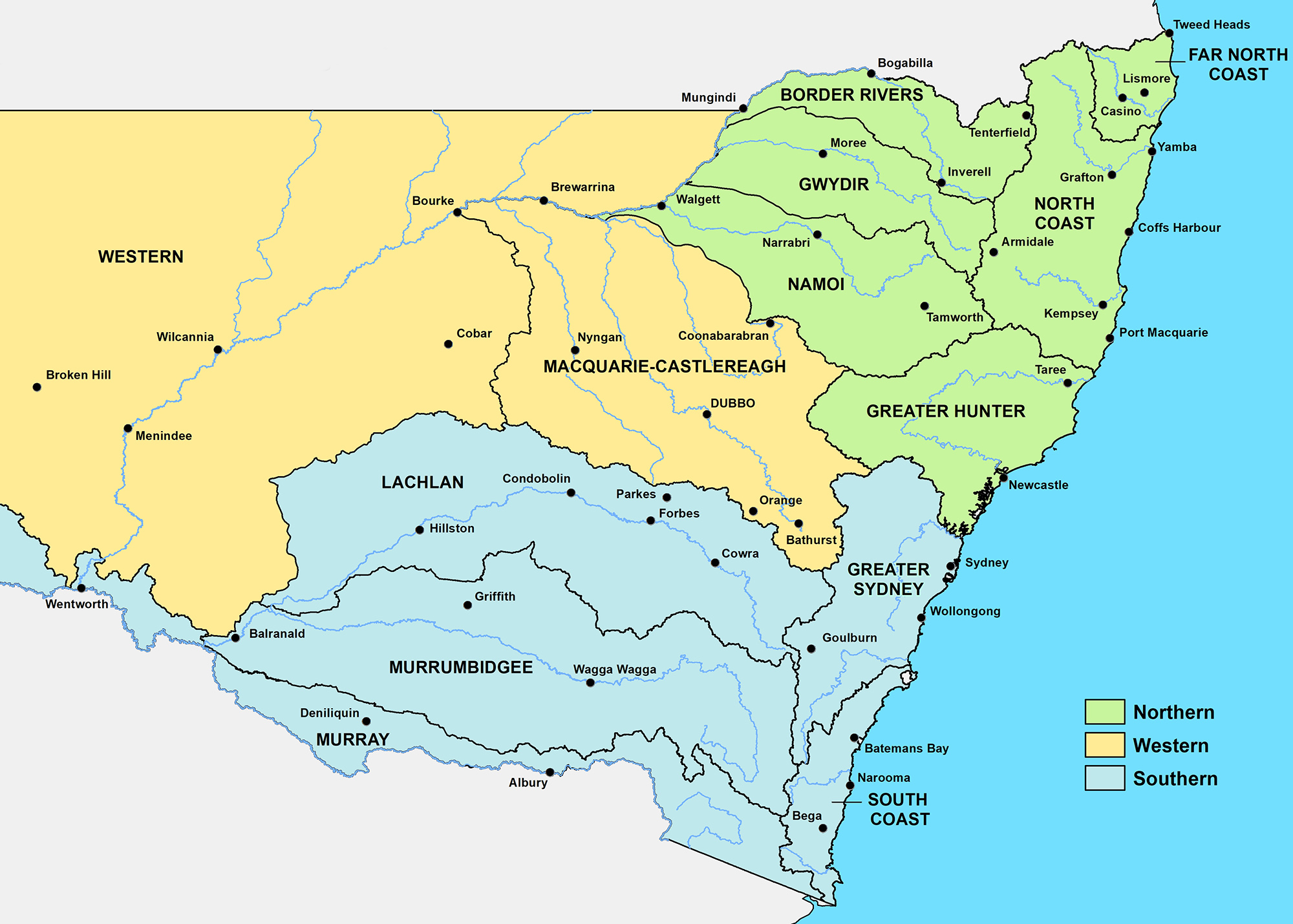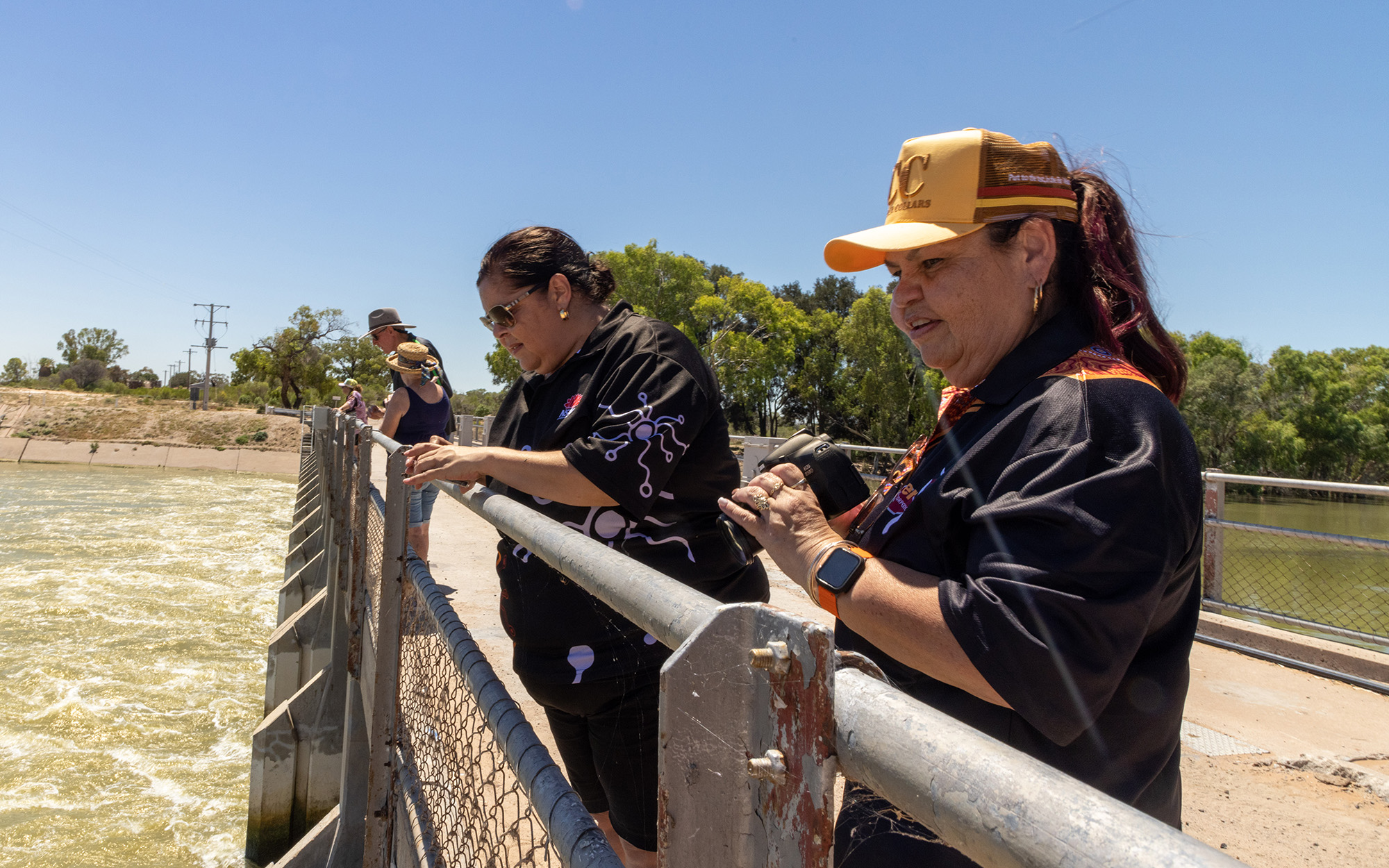Regional Aboriginal engagement – ‘Connecting with Country’
The Aboriginal Water Program has established a new Regional Aboriginal Engagement team of seven local Aboriginal staff. We want to yarn and build strong and collaborative relationships with your community to improve Aboriginal participation in water planning in NSW. We are reforming how the department engages with Aboriginal people as a commitment to improving cultural, economic, and social outcomes for Aboriginal people.
We want to care for Country together, so our team is:
- restoring sustainable partnerships with Aboriginal water stakeholders
- facilitating the exchange of knowledge between the department and Aboriginal communities for the inclusion of First Nations’ perspective in water management in NSW
- dedicated to servicing the Aboriginal engagement needs to facilitate meaningful Aboriginal participation in developing water strategies, policies and programs.
We have engagement team members located in northern, western and southern regions of NSW (see Figure 1). They can support Aboriginal communities to deliver local projects and initiatives and help build knowledge about water. To contact the engagement team, email water.enquiries@dpie.nsw.gov.au

Water interests on Country
The department has had many yarns with Aboriginal communities over the years to provide input on policies, plans, and other relevant documents. We will continue that yarn and include those conversations in the draft Aboriginal Water Strategy and other policy reforms.
You may have been at one of our meetings below or want to get involved in our water management reforms in the future.
Regional Aboriginal Water Committees
Regional Aboriginal Water Committees are being established to enable the voices of local Aboriginal people in inland and coastal water planning and management. Expressions of interests were open from 24 July to 24 August 2023. Find out more about the Regional Aboriginal Water Committees.
NSW Aboriginal Water Strategy
The Aboriginal Water Program is partnering with First Nations/Aboriginal People to co-design a state-wide Aboriginal water strategy that will identify a program of measures to deliver on First Nations’ water rights and interests in water management. Aboriginal communities will be encouraged to have their say on the draft Aboriginal water strategy. Find out more about the NSW Aboriginal Water Strategy.
Aboriginal women’s water conference
In May 2023, the Aboriginal Water Program hosted the first ever Aboriginal women’s conference on water in NSW, with over 115 Aboriginal women attending from across the state.
The conference recognised the deep connection between Aboriginal women and waterways. It brought further awareness and recognition to Aboriginal people’s way of life, rights, values, access and ownership of water for cultural and economic purposes.
The women highlighted how important it is for Aboriginal women to have a voice and be heard in decision-making processes. This is crucial to address cultural and heritage issues and to improve water management practices.
Regional Water Strategies
The department is preparing 12 regional water strategies in partnership with water service providers, local councils, communities, Aboriginal people and other stakeholders across NSW. Aboriginal peak bodies provided advice during the development of the strategies. Read more:
Water Sharing Plans
Water sharing plans set rules for sharing water between water users and the environment and bring water users into a single licensing system managed under the Water Management Act 2000.
They are the primary tools for defining how much water users can take out of the river or ground without impacting a healthy environment, define rights to water without a licence, including native title rights, basic landholder rights and harvestable rights, define rules for when licence holders can take water out of the river or ground.
The department works closely with Aboriginal communities to develop water sharing plans. Find out more about how water sharing plans work.
Water Resource Plans
Water resource plans are a key feature of the Commonwealth Basin Plan 2012. In NSW, the department developed 20 water resource plans. This follows three years of public consultation and discussion with stakeholders and the community.
To help build strong relationships with First Nations people to improve their participation in water planning into the future, the department engaged with 30 First Nations across the Murray-Darling Basin in NSW. This Nation-by-Nation approach considers the cultural values important to Aboriginal people, culture and Country. Find out more about Water Resource Plans.
NSW Groundwater Strategy
Aboriginal people have a deep connection to groundwater. Important cultural values are associated with wetlands, springs, caves and other groundwater dependent ecosystems. A long-term strategy has been developed to better protect and share the state’s vital groundwater resources. One of the actions of the strategy is to support Aboriginal people's rights, values and uses of groundwater. Read more about the priorities and actions of the NSW Groundwater Strategy.
Healthy Floodplains Project
Management of flood water in the northern Murray-Darling Basin is being reformed through the Healthy Floodplains Project. The reform will ensure a more certain and sustainable future for all water users and the environment. It will bring floodwater take in the northern Basin into the water licensing framework and reduce floodplain harvesting to within legal limits.Between 2014-2018, the department consulted with First Nations/Aboriginal Peoples on a valley-by-valley basis to inform development of the floodplain management plans for the Border Rivers, Gwydir, Macquarie, Barwon-Darling and Namoi valleys. Read more about the Healthy floodplains project and the cultural considerations.
Indigenous Cultural and Intellectual Property (ICIP) Protocol
The department’s Indigenous Cultural and Intellectual Property Protocol (PDF, 3116.7 KB) has been implemented to protect the rights that Aboriginal people have to their cultural heritage. ICIP includes traditional knowledge, traditional cultural expression, cultural objects, secret and sacred material as well as documentation of Aboriginal peoples’ heritage in all forms of media such as films, photographs, artistic works, books, reports, records taken by others, sound recordings and digital databases.
Section 8 of ICIP protocol includes the principles of free, prior and informed consent (FPIC). The NSW Government acknowledges these principles and the information provided by First Nations people during all engagement will only be used with the appropriate cultural approvals and permissions in place.
Contact us
Contact the Aboriginal Water Programs Regional Engagement team:
Email: water.enquiries@dpie.nsw.gov.au
Phone: 1300 081 047
